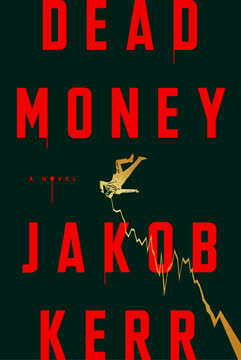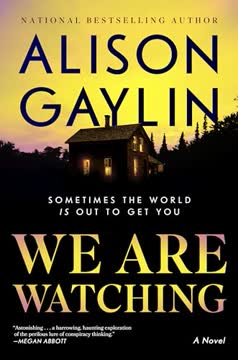Plot Summary
Night Shift Discovery
In the dead of night, Tony, a janitor at the opulent headquarters of Journy, stumbles upon the body of Trevor Canon, the company's enigmatic founder and CEO. Canon lies dead in his private office, a bullet wound between his eyes, blood pooling on the floor. The discovery sends shockwaves through the tech world, as Canon was not only a visionary but the linchpin of a company worth billions. The scene is eerily pristine, with only a missing laptop and a sense of violated sanctuary hinting at the violence that occurred. The murder's implications ripple outward, threatening not just Journy's future but the vast fortunes and ambitions tied to it.
The Fixer's Methods
Mackenzie Clyde, a tall, sharp-witted investigator for Hammersmith Venture, is introduced as she strong-arms a petulant tech founder into settling a lawsuit. Her approach is a blend of subtle flattery and blunt force, revealing her as someone who thrives in the morally gray world of Silicon Valley. Mackenzie's job is to make problems disappear for her boss, Roger Hammersmith, the most powerful venture capitalist in the Valley. Her success is rooted in her ability to read people, find leverage, and do whatever it takes—skills honed by a lifetime of being underestimated and learning to fight for her place.
Hammersmith's Assignment
Mackenzie is summoned by Hammersmith, who reveals the stakes of Canon's murder: not just the loss of a founder, but the freezing of $20 billion in company shares due to a "dead money" clause Canon added to his will. No one can touch the money or control Journy until someone is tried for the murder. Hammersmith, personally invested in both Canon and the company, tasks Mackenzie with representing the firm in the investigation, working alongside the FBI. The assignment is clear: protect the firm's interests, unlock the money, and ensure the investigation doesn't go off the rails.
Entering the Lion's Den
Mackenzie is paired with Special Agent Jameson Danner, a young, pedigreed FBI agent with a chip on his shoulder and a senator for a father. Together, they tour Journy's headquarters, meeting the company's COO, Eleanor Eden—Mackenzie's former lover—and the rest of the executive team. The investigation quickly reveals a web of secrets: Canon's missing laptop, anonymous badge access, and a company culture of paranoia and privilege. Danner's methodical approach clashes with Mackenzie's insider savvy, but both realize the killer had to be someone close to Canon, with intimate knowledge of the office and his routines.
The Giraffe's Fury
Flashbacks to Mackenzie's youth reveal the roots of her toughness. Mocked for her height and ostracized in high school, she learns to channel her anger into action—sometimes explosively, as when she punches a coach who humiliates her. These formative experiences, coupled with lessons from her pragmatic, working-class mother, teach Mackenzie that the world is unfair, and only those willing to seize opportunity and fight for themselves can hope to win. This ethos becomes her guiding principle in the cutthroat world of tech.
Old Flames, New Suspects
The investigation's emotional stakes rise as Mackenzie and Danner interview Eleanor, who is both a key suspect and Mackenzie's old flame. Eleanor describes Canon's growing paranoia, his secretive behavior, and the dead money clause. She provides a list of executives, each with potential motives and access. The interviews reveal that Canon's inner circle is fractured by jealousy, ambition, and resentment. Danner's logic points to an inside job, and the focus narrows to the executive team—each of whom stood to gain millions from Canon's death, but now find themselves locked out by his final act.
The FBI's Inner Circle
Danner and Mackenzie attempt to interview the executive team, but are stonewalled by their arrogance and evasiveness. One executive, Stanley Yoo, is missing entirely, having vanished after Canon's death. The others—Cassiopeia Moreau, Brady Fitzgerald, Hugo Chamberlain—offer alibis and deflections, but cracks begin to show. Cassiopeia's story is suspiciously neat, Brady is a resentful drunk, and Hugo is already plotting his exit. The missing laptop and badge logs point to a carefully planned crime, and the investigation becomes a race to find Yoo and uncover what Canon was hiding.
Lessons in Ruthlessness
More flashbacks reveal Mackenzie's mother, Janine, teaching her that the world is run by money and ruthlessness, not fairness. Janine's own life—marked by sacrifice, hard work, and ultimately, a prison sentence for embezzlement—serves as a cautionary tale and a blueprint. She urges Mackenzie to seize opportunity, be relentless, and never trust in the system to deliver justice. These lessons shape Mackenzie's worldview and her willingness to do whatever it takes, even as she navigates the moral ambiguities of her job and the investigation.
Executive Alibis Unravel
As Danner and Mackenzie dig deeper, the executive alibis begin to unravel. Cassiopeia's story about being at a wellness retreat is exposed as a lie—she left the retreat the night of the murder and was seen near a mysterious warehouse. Brady reveals that Canon was working on a secret project with Yoo, possibly backed by rival VC Indira Soti. Hugo, meanwhile, is caught negotiating a job with a competitor. The investigation uncovers a hidden warehouse, a prototype self-driving car, and evidence that Canon and Yoo were developing something far more valuable than Journy itself.
Shadows on Green Street
Mackenzie becomes aware she is being watched—first by a black Tesla lurking on her street, then by a break-in at her apartment, where a note is left: "WE ARE WATCHING." The threats are subtle but chilling, and Mackenzie realizes the investigation has drawn the attention of dangerous players. The sense of paranoia intensifies, and she is forced to rely on Danner and the FBI for protection, even as she suspects they are not telling her everything. The stakes are no longer just financial—they are life and death.
The Missing Genius
The search for Stanley Yoo becomes the investigation's central focus. Yoo, a brilliant but eccentric engineer, has disappeared without a trace, taking with him the secrets of Canon's final project. Evidence suggests he and Canon were working on a revolutionary AI, codenamed M1ND, in the warehouse. The project's potential is staggering, and multiple parties—including rival VCs, Russian oligarchs, and the FBI—are desperate to find Yoo and secure the technology. The investigation becomes a high-stakes game of cat and mouse, with Mackenzie caught in the middle.
The Coaching Incubator
Cassiopeia Moreau, Canon's girlfriend and Journy's CMO, is revealed to be both self-absorbed and deeply insecure. She pitches a new "coaching incubator" to Mackenzie, hoping for investment, but her real value is as a source of information. Under pressure, she admits to following Canon to the warehouse and lying about her alibi. Her testimony confirms that Canon and Yoo were working on something secret, and that others—including Soti—may have been involved. Cassiopeia's duplicity and desperation highlight the toxic mix of ambition and vulnerability at the heart of Journy's culture.
The Drunk Co-Founder
Brady, Journy's sidelined co-founder, is a study in bitterness and self-destruction. He reveals that Canon was meeting with Soti in secret, and that the executive team was fractured by jealousy and betrayal. Brady's own motives are clouded by regret—he sold his shares too early, missing out on billions, and now drinks away his resentment. His account of a violent confrontation at the warehouse, and his knowledge of Canon's secret project, add new layers to the mystery. But his alibi holds, and suspicion shifts elsewhere.
The Fatalist's Revelation
Hugo, the fatalistic product chief, is caught negotiating a job with a rival. He reveals that Journy is failing—growth has stalled, the money is gone, and Canon's grand vision is collapsing. Hugo's cynicism is matched by his self-interest; he is already planning his escape. His testimony confirms that Canon's real focus was on M1ND, and that the company's future is bleak. The investigation's motive shifts from financial gain to technological control—whoever controls M1ND controls the future.
The Russian Connection
The investigation uncovers a deeper layer: Hammersmith's firm is funded by Russian organized crime, known as the Ten. Their enforcer, Vitaly Kovalev, is identified as the man who broke into the warehouse and later killed Canon. The Ten's interest in M1ND is both financial and strategic—they see it as a tool for global power. Hammersmith, under pressure from his criminal backers, orchestrates the murder to regain control of the technology and salvage his empire. The conspiracy is vast, implicating the highest levels of Silicon Valley and international crime.
The Warehouse Break-In
Security footage from the warehouse reveals Kovalev's brutal assault on Yoo and Canon, and the theft of critical data. The warehouse is a crime scene, with blood in the bathroom and evidence of a hasty departure. The missing laptop and prototype are the keys to M1ND, and whoever possesses them holds the future in their hands. The FBI realizes that finding Yoo is the only way to tie the conspiracy together and bring the killers to justice.
The Burning Man Lead
Mackenzie deduces that Yoo, a devoted Burner, is hiding at Burning Man, using his camp Circus Sagittarius as cover. The FBI sets a trap, using Mackenzie as bait to draw out Kovalev and the Ten. The plan is risky—Mackenzie must find Yoo before Kovalev does, and survive long enough for the FBI to spring their trap. The desert festival becomes a surreal stage for the story's climax, blending chaos, art, and mortal danger.
The Trap is Set
At Burning Man, Mackenzie locates Yoo in the Temple, mourning Canon. As they attempt to escape, Kovalev and his men arrive by helicopter, triggering a desperate chase across the Playa. Yoo is injured, Mackenzie is nearly killed, and Kovalev is finally brought down by Danner in a dramatic shootout. The FBI arrests Hammersmith as he tries to flee the country, and the conspiracy is exposed. The cost is high, but the truth is finally revealed.
The Playa Showdown
In the aftermath, Mackenzie and Danner confront the moral ambiguities of their actions. Mackenzie's role as both investigator and pawn is exposed—she was used by the FBI as bait, just as she used others to survive. The lines between justice and self-preservation blur, and the true nature of power in Silicon Valley is laid bare. Mackenzie and Eleanor, having orchestrated much of the chaos, emerge unscathed, ready to seize the next opportunity.
Endgame and Aftermath
A year later, Mackenzie and Eleanor are co-founders of M1ND, now the most valuable AI company in the world. Danner, promoted but haunted by the case, confronts Mackenzie with his suspicions—he believes she and Eleanor orchestrated Canon's murder and manipulated the investigation. Mackenzie, unflappable, denies everything, knowing that in America, people get away with murder every day. The story ends with Mackenzie triumphant, having done whatever it took to win, and the cycle of ambition, ruthlessness, and reinvention ready to begin anew.
Characters
Mackenzie Clyde
Mackenzie is the novel's protagonist—a towering, sharp-witted investigator who has clawed her way up from a difficult childhood marked by poverty, loss, and her mother's imprisonment. Shaped by lessons in ruthlessness and self-reliance, she is both a product and a critic of Silicon Valley's culture. Mackenzie's relationships are transactional, her loyalty is to herself, and her moral compass is flexible. Over the course of the story, she evolves from fixer to power player, ultimately leveraging her knowledge and alliances to become a billionaire co-founder of M1ND. Her psychological complexity lies in her ability to navigate—and manipulate—the systems of power, always aware of the costs and willing to pay them.
Roger Hammersmith
Hammersmith is the most powerful venture capitalist in Silicon Valley, a man whose influence is matched only by his ambition. Outwardly jovial and avuncular, he is in reality a master manipulator, willing to do anything to protect his empire. His partnership with Russian organized crime, the Ten, is both his greatest asset and his undoing. Hammersmith's relationship with Mackenzie is transactional—he recognizes her value and uses her as both weapon and shield. When the stakes rise, he orchestrates Canon's murder to regain control, but is ultimately brought down by the very ruthlessness he prizes.
Eleanor Eden
Journy's COO and Mackenzie's former lover, Eleanor is a study in duality. Publicly, she is the face of female leadership in tech—a bestselling author, a mentor, a "soccer mom" persona. Privately, she is as ambitious and calculating as any of her male peers. Eleanor's alliance with Mackenzie is rooted in shared values and mutual recognition of the game's rules. She is instrumental in uncovering Canon's secrets and, ultimately, in orchestrating the power play that leaves her and Mackenzie in control of M1ND. Her psychological complexity lies in her ability to wear masks, to be both nurturing and ruthless as the situation demands.
Jameson Danner
The young FBI agent assigned to the case, Danner is both a product of privilege (his father is a powerful senator) and a man desperate to prove himself on his own terms. He is methodical, intelligent, and increasingly aware of the moral compromises required by his job. Danner's relationship with Mackenzie is fraught—he alternates between condescension and respect, ultimately realizing he has been outmaneuvered. His psychological arc is one of disillusionment, as he confronts the limits of justice and the realities of power.
Trevor Canon
The murdered founder of Journy, Canon is the archetype of the Silicon Valley genius: brilliant, driven, and ultimately undone by his own ambition. His paranoia and secrecy are both cause and effect of the pressures he faces—from investors, rivals, and his own executive team. Canon's final project, M1ND, is both his legacy and the catalyst for his death. In life, he inspires loyalty and resentment in equal measure; in death, he becomes the object of a ruthless struggle for control.
Stanley Yoo
Journy's CTO and Canon's closest collaborator, Yoo is a reclusive genius whose technical skills are unmatched. His disappearance after Canon's death makes him both a suspect and a target. Yoo's loyalty to Canon is genuine, but his primary allegiance is to his own work. He is the key to M1ND, and his survival is the linchpin of the story's resolution. Psychologically, Yoo is detached, focused on creation rather than politics, but ultimately forced to confront the human costs of his brilliance.
Cassiopeia Moreau
Canon's girlfriend and Journy's CMO, Cassiopeia is a master of self-presentation but deeply insecure beneath the surface. Her ambitions are grand, but her talents are limited. She lies to protect herself, pitches dubious ventures, and is ultimately a minor player in the larger game. Her psychological arc is one of exposure—her masks are stripped away, revealing the vulnerability and desperation beneath.
Brady Fitzgerald
Journy's co-founder, Brady is a cautionary tale of missed opportunity and festering resentment. He sold his shares too early, lost his influence, and now drinks away his bitterness. His knowledge of Canon's secrets is valuable, but his unreliability makes him both a suspect and a red herring. Psychologically, Brady is trapped by his own sense of injustice, unable to move on or adapt.
Hugo Chamberlain
Journy's chief product officer, Hugo is a pessimist who sees the writing on the wall and plans his exit accordingly. He is the first to reveal the company's decline and Canon's misplaced priorities. Hugo's loyalty is to himself, and his actions are driven by self-preservation. Psychologically, he embodies the cynicism and transactional nature of the tech world.
Vitaly Kovalev
The Ten's enforcer, Kovalev is a former KGB operative whose presence brings real danger to the story. He is the instrument of Hammersmith's will, carrying out violence with cold efficiency. Kovalev's psychological makeup is simple but terrifying—he is a predator, motivated by power and the pleasure of dominance. His pursuit of Yoo and Mackenzie is relentless, and his eventual death is both a relief and a warning.
Plot Devices
Nested Conspiracies and Shifting Motives
The novel employs a series of nested conspiracies, each revealing a deeper layer of motive and culpability. What begins as a classic whodunit—a murder in a locked office—quickly expands into a corporate thriller, a financial crime saga, and finally an international conspiracy. Each revelation reframes the stakes and the suspects, keeping the reader off-balance. The use of flashbacks, shifting perspectives, and unreliable narrators deepens the sense of ambiguity and moral complexity. Foreshadowing is deftly used—early hints about Mackenzie's past, the missing laptop, and the Russian connection all pay off in the climax. The structure mirrors the matryoshka doll metaphor: each solution contains a new mystery, and the truth is always more complicated than it first appears.
Analysis
Dead Money is a razor-sharp dissection of power, ambition, and moral ambiguity in the world of tech and finance. Jakob Kerr's novel is both a page-turning thriller and a biting social commentary, exposing the rot beneath Silicon Valley's utopian veneer. The story's central lesson is that the systems we trust—corporate, legal, even personal—are built on self-interest, ruthlessness, and the willingness to do whatever it takes. Mackenzie Clyde's journey from outsider to kingmaker is both inspiring and chilling; she survives not by virtue, but by adaptability and a clear-eyed understanding of the game's rules. The novel interrogates the myth of meritocracy, the seduction of wealth, and the cost of ambition. In the end, justice is a matter of perspective, and the winners are those who write the history. Dead Money asks us to consider: What are we willing to sacrifice for power? And can anyone truly escape the consequences of their choices?
Last updated:
Review Summary
Dead Money is Jakob Kerr's debut thriller set in Silicon Valley's tech world. Readers praise its twisty plot, strong characters, and engaging mystery. The story follows Mackenzie Clyde, a fixer for a venture capital firm, investigating a tech CEO's murder. Many reviewers found it gripping and unpredictable, with clever writing and a satisfying ending. Some critiqued pacing issues and predictable elements. Overall, it's well-received as a smart, suspenseful read that offers insight into the cutthroat tech industry.
Similar Books
Download PDF
Download EPUB
.epub digital book format is ideal for reading ebooks on phones, tablets, and e-readers.














